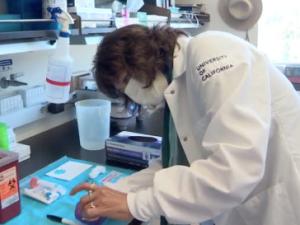

Research Bio
Martyn T. Smith PhD is a Professor of Toxicology and the Kenneth Howard and Marjorie Witherspoon Kaiser Endowed Chair in Cancer Epidemiology at University of California, Berkeley. Dr. Smith is a laboratory scientist with expertise in molecular epidemiology, toxicology, and genomics, and his research is aimed at finding the causes of chronic diseases, including cancer and diabetes. He currently teaches Toxicology and Health Risk Assessment and mentors graduate students and postdoctoral scholars in the Molecular Toxicology, Epidemiology and Environmental Health Science programs. He has mentored dozens of graduate students and post-docs in his 36 years at UC Berkeley. Dr. Smith is a Fellow of the American Association for the Advancement of Science. He received the 2010 Children’s Environmental Health Network Award, became an Elected Fellow of the Collegium Ramazzini in 2012, and received the Alexander Hollaender Award from the Environmental Mutagenesis and Genomics Society in 2014.
Dr. Smith has led the Superfund Research Program (SRP) Center at Berkeley since its inception in 1987. This Center has been peer-reviewed and renewed 6 times and is funded at approx. $2.15m per annum, making it one of the largest NIH grants on the Berkeley campus. It is widely considered one of the flagship programs for NIEHS SRP. The Center consists of six interactive projects (4 biomedical and 2 engineerings) and 5 cores that aim to address critical problems at toxic waste sites through original research, translation to appropriate end-users and community engagement efforts. We focus on exposures to high priority chemicals commonly found at Superfund sites, including arsenic, benzene, trichloroethene, formaldehyde and polycyclic aromatic hydrocarbons to address the specific mandates of the Program. We take a novel approach to adopt the so-called ‘exposome paradigm’ in our research. This new paradigm, which we helped develop, allows for a ‘seeing the whole picture’ approach to risk assessment, hazard identification and the safe and effective remediation of hazardous sites containing multiple chemicals. In the exposome paradigm, all nongenetic environmental stressors are considered as environmental exposures. Therefore, cumulative risk assessment, where the impact of all stressors on a population is assessed, could be operationalized by exposomics. Communities living near sites face cumulative risks from a variety of environmental and social factors. The theme of our Center is, therefore, the exposome and we propose a step-wise approach to applying exposomics to help solve the complex problems found at Superfund sites.
Research Expertise and Interest
cancer, genomics, toxicology, molecular epidemiology, exposome, leukemia, lymphoma, breast cancer, carcinogenesis

